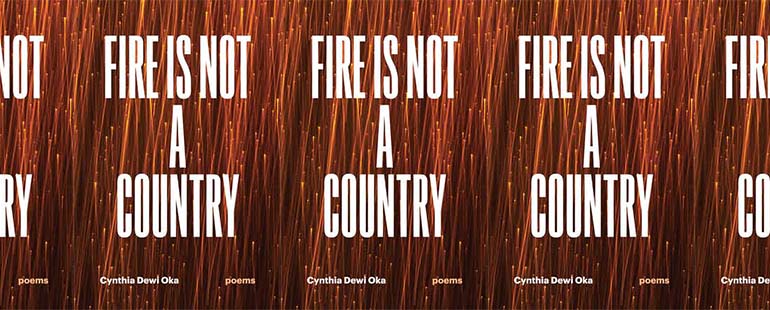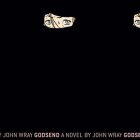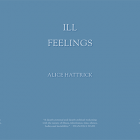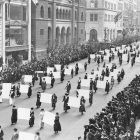Fire Is Not a Country’s Observation of the Apocalypse

You will know the apocalypse is near not when the ocean catches on fire or when birds fall from the sky, but when the middle class starts accessorizing for it. Currently, you can find at Pottery Barn a photogenic 3-day emergency bag that contains not only the requisite first aid kit, but also “premium comforts” such as Mast chocolate, Malin+Goetz skincare, Marvis toothpaste, and more. What can be derided as gentrified logistics is run-of-the-mill aspirational branding, and the aspiration remains the same as it ever was—social mobility. Striving for the dwindling echelons of capitalism even in dire situations is the logical consequence of algorithms harnessing our otherwise benign desire to become a more authentic version of ourselves.
This tension between the self and the marketplace is the kindle in Cynthia Dewi Oka’s new book of poetry, Fire Is Not a Country, out next week. The collection, dedicated to her son, draws much of its power from domestic scenes set against an apocalyptic background. The end of the world is not new to the characters who inhabit Oka’s writing; their lives have already been shaped by intimate versions of it—violence, illness, heartbreak, financial precarity. Here social mobility is not merely an aspiration, but a search for safety through a series of complex, unsparing negotiations with the self. What must we carry within ourselves to reach a safe place (will it become a burden?), and what must we leave behind (will it set us free?)?
Oka takes no detours in exposing the complications of such a quest. The first line of the first poem, “Meditation on the Worth of Anything” begins with a transaction written like a negotiation by slipping in the word “if.”
A tall man wipes ashes from his lips. “I’ll pay you,”
he says. “If you’re worthy.”
The “if” that Oka uses has deep roots in fairy tales and other oral traditions, often used by figures of authority who intend to break the contract they initiated. Despite the man’s dominating position in the poem, a negotiation is occurring outside his reach, inside his interlocutor—a delicate calibration of needs, of human dignity, of resistance to secure a future that will not repeat the past.
Sometimes she weeps because memory is long
and bendy, a red line that curves against the globe instead of
cutting through the center.
This matrix finds an echo in “Redacted from a Know-Your-Rights Training Agenda,” in which an initiative meant to help workers is met by Oka with ambiguity and skepticism. It is not the powerlessness of the trainees that is examined, so much as the necessity to act as an intermediate in a system in which non-profit organizations must palliate the failures of a government to protect its people.
Since the florescent grid of the factory and the vista of small bones in my father’s collar while I was interpreting for the twenty-something-year-old white citizen,
Tell your dad he can quit or I can fire him.
It is a lyrical and brutal illustration of what Frantz Fanon described as colonial power through language, the use of syntax and morphology to support the weight of a civilizing culture—“to convey the master’s orders to their fellows.” This is the dirty truth of tokenism, and Oka has a keen eye for it, but she never condemns the calculations that lead people there. Instead, her writing illuminates kinship, because gaining access to colonial power sometimes means giving your loved ones a fighting chance. In “Driving to York Prison in a Thunderbird,” she relates a friend’s familial vicissitudes with warmth and humor:
I’m in the passenger seat, and Henry, whose nephew will
be facing the judge today, is punching the pedal like a god-
like Dr. Who while taking strategic bites of his croissant
so as not to get buttery flakes all over the red leather seat.
In between, he regales me with his early years in America
(he was a banker back home) scrubbing toilets in exchange
for a sushi chef apprenticeship. (He’s a restauranteur now.)
I too, offer tales of sacrifice and survival, because well,
what else do you do while you are being hunted?
The funniest parts of the book, however, are in the four interludes that appear in the collection. The scripted dialogues include aunties refusing to find shelter in what appears to be a horrific catastrophe happening in the background while they continue to chitchat about sex and karaoke; an invisible woman conversing with a disembodied voice while doing groceries; an association of dentists forcing politicians to tell the truth; and, finally, a musically inclined teenager walking away from ghostly apparitions.
In the first interlude, Oka makes the bold choice of having the aunties speak in “broken” English: “But maybe we will meet young handsome guy who is alone. Look, I put my nails on. I get my Brazil waxed!” The typical context surrounding broken English is caricature, but Oka treats broken English with the respect of a fully formed language—she has the aunties speak to one another in this way, rather than having them interact with an outsider. We get the sense that this is a conversation the women would be having no matter who was within earshot. Can a language be called broken if it connects people together? What is poetry but language being strategically broken? For once, the math is simple. Learn enough to earn an income, neglect syntax to speak safely amongst friends. It is a stoic positioning that demands compensation rather than begs for validation—a neat reversal of colonial tokenism.
The four interludes are tied together by a didactic absurdity that recalls Eugene Ionesco’s post-war play, Rhinoceros. Written in 1959, Rhinoceros is about people turning into rhinoceroses, until only one man is left, yelling that he will never accept the transformation. Back then as well as now, a didactic bent (a criticism also levied at Ionesco) was usually discouraged in writing circles, which perhaps reveals a strange amnesia regarding oral traditions. By channeling those traditions, Oka offers both a counterpoint to her mastery of English and the source of this mastery. Southeast Asian readers will recognize the irreverent banter, a respected form meant to demonstrate a storyteller’s verbal agility. It is a rapid-fire game of memory and lyricism, meant to travel lightly in places where novels cannot.
Fire Is Not a Country is the third book published by Oka, and there’s a sagacious impatience to her writing. It is not the impatience of a writer rushing to get a collection out, but the impatience of a woman who has been observing apocalypses for a long time. This is the place where Oka writes from—a place of urgency, of fire, of meteorites that crash on the face of the earth. In the last piece of the book, fittingly titled “Art of Revision,” a father holds on to God while a daughter holds on to her colored pencils. They are non-erasable. This too feels like the end of the world. What is written cannot be taken back. Or can it? Here I turn to comic books, a place where apocalypses also occur in countless iterations. “That’s where I grew up, the ends of a thousand worlds,” says one Marvel character. “And now, that’s where I’ll die.”
But of course, she won’t.
This piece was originally published on November 16, 2021.



